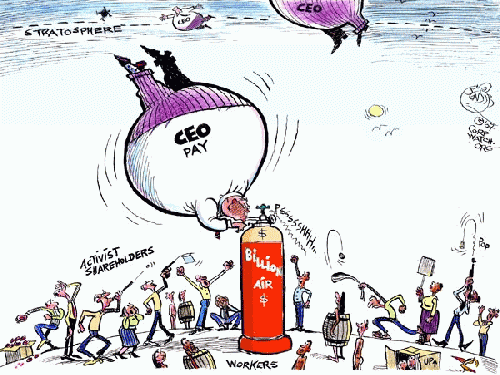Cartoon by Khalil Bendib
by Puck Lo , CorpWatch Blog : http://www.corpwatch.org/article.php?id=15823
March 8th, 2013
Nearly 70 percent of Swiss voters approved a "fat cat" referendum that would prohibit "golden handshake" bonuses to departing corporate bosses while the European Union approved legislation limiting bankers executive bonuses to a maximum of one year's salary, or twice that amount if a majority of shareholders approve.
These new laws come as a public outcry mounts around the world against bloated executive compensation packages, taxpayer-funded bank bailouts and Wall Street style profiteering. (See "Do Not Pay Dozen: 12 CEOs Who Met Shareholder Spring Revolts")
Last month, lawmakers and investors were enraged when Novartis, the Swiss pharmaceutical giant, offered Daniel Vasella, its outgoing chairman, $1.1 million every month for six years (a total of $78 million) in order to keep the former CEO from going to work for the company's competitors. Novartis quickly rescinded the offer.
But it was too late. Vasella had unwittingly become a symbol of greed and excess in Switzerland fueling growing national support for legislation to curb corporate voraciousness. In 2012 -- a year in which the company laid off nearly 2,000 workers - Vasella took home nearly $14 million, according to the company's annual report.
Christian Democratic People's Party President Christophe Darbellay told SonntagsZeitung newspaper that the offer was "beyond evil."
Vasella was hardly alone. Five of Europe's 20 highest-paid CEOs work for Swiss companies - according to data compiled by Bloomberg News - including ABB, an industrial group, Credit Suisse bank, Nestlà �, the food giant, Novartis and Roche, both pharmaceutical companies.
This past Sunday the Minder initiative was approved by 68 percent of Swiss voters. It outlaws executive compensation packages that encourage company takeovers and sell-offs. It would also make it mandatory for shareholders, including pension funds, to make decisions on executive pay that companies would be bound to honor.
All publicly traded Swiss companies listed in the Swiss or foreign stock exchanges will be required to follow the law. Violators could be punished with up to three years of prison time and fines totaling six years worth of salary.
The Swiss referendum came on the heels of a February 27 vote by the Economic and Financial Affairs Council of the European Union that approved legislation to limit bank executive bonuses to a maximum of one year's salary, or twice that amount if a majority of shareholders approve. It will apply to bankers working in all 27 EU states (including those owned by foreign companies) and those working abroad for EU-based banks and their subsidiaries.
The rule is part of the Basel III financial reform package that requires banks to set aside more funds in reserve in order to make them more stable and guard against expensive taxpayer bailouts in the future.
"If we had had rules (on financial reserves) like this six years ago, the Lehman case wouldn't have happened, or at least not with such devastating consequences," said Michel Barnier, the EU commissioner who oversees financial regulation, referring to the collapse of the New York investment bank in 2008 that was widely seen as the precipitating event in the global financial meltdown that year.
While the financial reserves rules could make the banks less likely to fail, the rules on bankers pay are unlikely to be effective.
(Note: You can view every article as one long page if you sign up as an Advocate Member, or higher).





